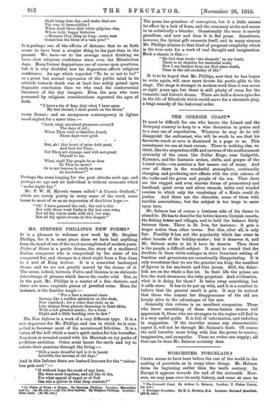THE CORNISH COAST.* Ix must be difficult for one who
knows the Lizard and the Newquay country to keep to a wise discretion in praise and to a sane use of superlatives. Whatever he may do he will disappoint the enthusiast, who will be wroth to see that his favourite reach or cove is dismissed in a page or so. This resentment we can at least excuse. There is nothing else, we think, like the serpentine cliffs and caverns of the southernmost extremity of the coast, like Dollar Hugo, near Cadgwith, Kynance, and the fantastic arches, clefts, and gorges of the Lizard rocks,—we mention a few names out of many. And over all there is the wonderful atmosphere, continually changing and producing new effects with the rich colours of the rocks and the green and purple of the sea. Then there are the rugged and even sinister forma of promontory and headland, quiet coves and silver strands, inlets and wooded combes to which only the vocabulary of a Keats could do justice. And there are the churches, some of them with terrible associations ; but the subject is too large to enter upon here.
Mr. Salmon has of course a business side of his theme to attend to. He has to describe the better-known Cornish resorts, the fishing towns and villages, and to hold the balance fairly between them. There is St. Ives, for instance : it gets a larger notice than other towns. But this, after all, is only fair. Possibly it has not the popularity which has come to other haunts of the holiday-maker ; but it deserves it, and Mr. Salmon seeks to let it have its deserts. Then there is the people, a difficult subject. It must be owned that the dwellers in these white cottages in their luxuriant setting of fuschias and geraniums are occasionally disappointing. It is only sometimes that we see the genuine sea king, the manliest of figures in his sea-boots and blue jersey. Still, the fisher- folk are on the whole a fine lot. In their life the prizes are few, the work strenuous, the risks perpetual. And civilisation, what is it doing for them ? It takes away something, but it adds more. It has to be put up with, and it is a comfort to believe that the general result is gain. It may be noticed that those who lament the disappearance of the old are keenly alive to the advantages of the new.
Generally this volume is an excellent companion. Those who know something of these storm-beaten shores will appreciate it, those who are strangers to the region will find in it a very useful guide. It is full of information, and unfailing in suggestion. If the traveller misses any characteristic aspect it, will not be through Mr. Salmon's fault. Of course the said traveller must bring with him the power to receive, imagination, and sympathy. These no writer can supply ; all that can be done Mr. Salmon certainly does.


















































 Previous page
Previous page